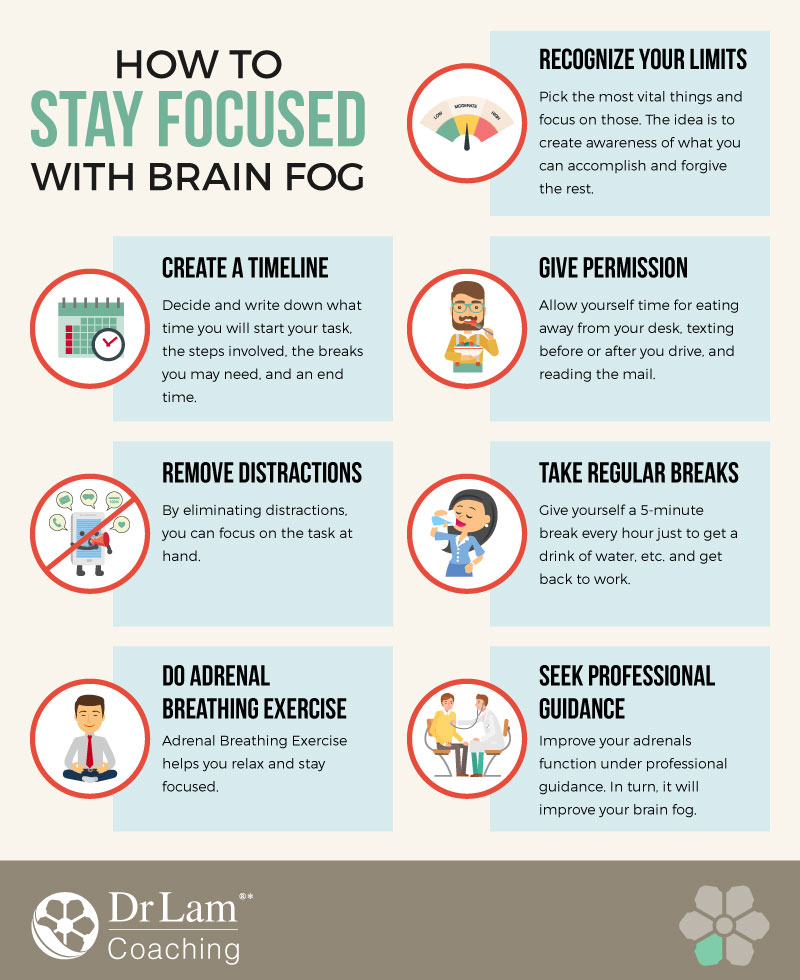 Adrenal Fatigue Syndrome (AFS) can wreak havoc on brain function. Many sufferers report inabilities concentrating on work, and completing daily to-do lists, they don't know how to stay focused. In addition to the direct problems caused by these symptoms—including negative effects on job performance—feelings of frustration can cause stress, exacerbating the underlying condition. Brain fog is commonly associated with this phenomenon and tends to occur when the body is overly stressed. Such an inability to focus can be part of the neuroaffective response, a component of the body’s overall NeuroEndoMetabolic (NEM) stress response.
Adrenal Fatigue Syndrome (AFS) can wreak havoc on brain function. Many sufferers report inabilities concentrating on work, and completing daily to-do lists, they don't know how to stay focused. In addition to the direct problems caused by these symptoms—including negative effects on job performance—feelings of frustration can cause stress, exacerbating the underlying condition. Brain fog is commonly associated with this phenomenon and tends to occur when the body is overly stressed. Such an inability to focus can be part of the neuroaffective response, a component of the body’s overall NeuroEndoMetabolic (NEM) stress response.
The human body responds to stress as a whole, using most of your organs, systems, and pathways, as well as a large variety of chemical reactions. When a given organ—such as the adrenal glands, which produce the stress fighting hormone cortisol—is under attack, your central nervous system, brain, and other organs will all respond. Many organs and systems produce, secrete, and/or regulate hormones, so it is imperative to Adrenal Fatigue recovery to recognize this connection and take steps to regulate the body as a whole to properly support adrenal recovery. This whole-body approach is known as the NEM stress response model; the neuroaffective response is one component of this model. The central nervous system, autonomic nervous system, and GI tract all help to regulate your neuroaffective response.
The central nervous system responds to stress by engaging the metabolic and hormonal circuits. As stress increases, the neurotransmitters in your brain fail to maintain mood balance, keep you alert when needed, and allow rest when appropriate; brain fog, insomnia, anxiety, depression, and mood swings therefore become more frequent and intense. The GI tract is also involved in the production of many of our neurotransmitters, and is commonly known as the second brain. Norepinephrine, created in the gut, supports alertness and is part of the autonomic nervous system. Over-activation of this transmitter results in symptoms in the cardiovascular system as well as changes in your mood and affect. This is why you may experience increased heart rate or a sense of pounding or fluttering when overly stressed. You may also feel extremely anxious. When the neuroaffective response system is not functioning properly, you have trouble with sleep, mood, clarity, alertness, and stress management. To heal and recover from AFS, you must rebalance your neuroaffect and all of your organs and systems.
 It may seem impossible to manage brain fog and get on top of how to stay focused. Even getting started is a huge barrier when you already feel overwhelmed.
It may seem impossible to manage brain fog and get on top of how to stay focused. Even getting started is a huge barrier when you already feel overwhelmed.
Do you start one project just to abandon it a few minutes later when you start thinking about something else you need to do? Perhaps you check your email or read something you’d like to share on Facebook. Or maybe you get an Instagram or twitter notification and then get lost for half an hour. Everyone is guilty of these time-sucking transgressions—especially in today’s electronic society—but when we jump from one thing to another we are just dabbling in everything, and not focusing on anything. Similar to the old adage “Jack of all trades, master of none,” you can’t excel at anything if you are doing everything. Thankfully, there are some ways to train your brain and learn how to stay focused—even on the hardest of days in the advanced stages of Adrenal Fatigue Syndrome.

1. Recognize Your Limits – You won’t be able to accomplish much on a bad AFS day, so don’t overwhelm yourself with an impossible task list. Pick the most vital things and focus on those. The idea is to create awareness of what you can accomplish and forgive the rest, so that your body does not react to more stress.
2. Create a Timeline – Decide and write down what time you will start your task, the steps involved, the breaks you may need, and an end time. Do this for each task. Scheduling your day gives you structure for completion and helps you get back on track when you stray. Crossing off each item as you complete it helps provide a sense of accomplishment, and with each completion, you may feel your stress lessen.
3. Give Permission – Allow yourself time for eating away from your desk, texting before or after you drive, and reading the mail. These are things you need to do, but they must be scheduled and not crammed. After all, there is no way to safely text while driving, and you won’t enjoy a meal that you munch as you type. Set aside a block of time for these tasks, but no more than one hour of your total work time.
4. Remove Distractions – By eliminating distractions, you can focus on the task at hand. It can be hard to resist the ping of a text message, so record a voicemail message and a text auto responder that tells callers what time you will return their message. Then turn the phone off and get to work.
 5. Take Regular Breaks – A mind that wanders will find a way, so train your brain to wait for the wander. Give yourself a 5-minute break every hour just to get a drink of water, do some adrenal breathing exercises, and get back to work. Knowing you will have this break will help your wandering brain.
5. Take Regular Breaks – A mind that wanders will find a way, so train your brain to wait for the wander. Give yourself a 5-minute break every hour just to get a drink of water, do some adrenal breathing exercises, and get back to work. Knowing you will have this break will help your wandering brain.
Use these five tips for how to stay focused to power through the brain fog and your day. But remember, these are coping strategies only: it is also important to address the underlying cause of brain fog and resolve it as soon as possible. Only then will your mental capacities once again flourish.
